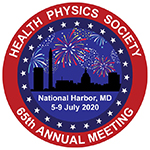Current News Archive
 Isaf Al-Nabulsi, PhD, US Department of Energy
Isaf Al-Nabulsi, PhD, US Department of Energy
At the Health Physics Society (HPS) 65th Annual Meeting, which will be held at the National Harbor, Maryland, 5–9 July, a special technical session will be devoted to presentations and discussions of ongoing activities at the US Department of Energy (DOE) Office of Domestic and International Health Studies. Cochaired by Dr. Isaf Al-Nabulsi and Dr. Patricia R. Worthington, this session is scheduled for Wednesday, 8 July.
The Atomic Energy Act of 1957, Section 8(a) requires research and development activities relating to the protection of health during research and production activities. The requirement is fulfilled by supporting health studies and other research activities to determine if DOE workers and people living in communities near DOE sites are adversely affected by exposures to hazardous materials from DOE operations and to address critical research needs for important occupational exposures. The ultimate use of the information is to protect and promote the health of DOE workers, their families, and residents of neighboring communities and to share the information and data with the public.
The purpose of the international health studies and activities is to support the health and safety mission of DOE by providing new knowledge and information about the human response to ionizing radiation and other industrial exposures encountered in the workplace or within nearby communities. Activities are underway in Japan, the Marshall Islands, and the Russian Federation. These activities represent unique opportunities to enhance our knowledge and to establish science-based worker and public protection standards and to fulfill humanitarian purposes.
The goal of this session will be to increase awareness of ongoing health studies activities supported by the DOE. HPS members are invited and encouraged to attend the session. The invited speakers for the special session include:
- Terry Hamilton, Lawrence Livermore National Laboratory—Enewetak Atoll Resettlement: An Untold Story
- Sergei Y. Tolmachev, US Transuranium and Uranium Registries (USTUR)—US Transuranium and Uranium Registries: 2010–2020 Research Accomplishments and Collaborative Efforts
- Joey Zhou, DOE, and Martin Sefl, USTUR—Uncertainties in Radiation Dose Assessment for Internally Deposited Plutonium in Support of Radiation Epidemiology
- Maia Avtandilashvil, USTUR—Beryllium in the Tissues of Former Nuclear Workers
- Bruce Napier, Pacific Northwest National Laboratory—Recent Improvements in Dose Reconstructions for the JCCRER Russian Studies
- Dale Preston, Hirosoft International—Recent Findings on Cancer Risks and Chronic Radiation Exposure in the Mayak Worker and Techa River Cohorts
- Christopher Loffredo, Georgetown University—The Russian Human Radiobiological Tissue Repository: A Unique Resource for Studies of Plutonium-Exposed Workers
- Eric Grant, Radiation Effects Research Foundation (RERF)—Pilot Study: Dosimetric Impact of a New Computational Phantoms for the Japanese Atomic Bomb Survivors
- Kotaro Ozasa, RERF—Cancer Incidence Among Atomic Bomb Survivors in Hiroshima and Nagasaki
- Osamu Tanabe, RERF—Biorepository of A-Bomb Survivors and Their Offspring
- Sara Howard, Oak Ridge Associated Universities (ORAU)—A Treasure Trove of Radiation Monitoring Data: Review of the Department of Energy's Comprehensive Epidemiologic Data Resource (CEDR)
- Ashley Golden, ORAU—Are Women at Greater Risk Than Men?: Sex-Specific Lung Cancer Risks From the Million Person Study
- Caleigh Samuels, ORAU—Plutonium Bioassay Models for Reconstruction of Doses for Los Alamos National Laboratory and Rocky Flats Workers
- Caitlin Milder, Vanderbilt University—Very Early DOE Worker Studies: Obtaining Vital Status, Estimating Organ Doses, and Preliminary Results
For more information about the session, please contact Dr. Isaf Al-Nabulsi.




